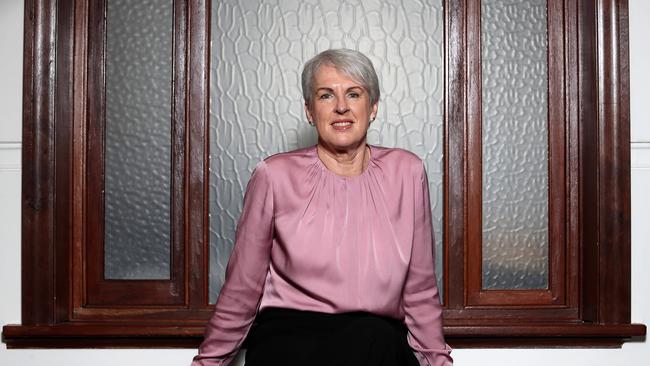Open borders, learn to live with Covid: Diane Smith-Gander
Chairs of CBA, Telstra and Zip Co blast lockdowns and call for more policy, less politics in fighting the pandemic.

Zip Co chair Diane Smith-Gander has taken aim at governments over their haste to slam borders shut, arguing that Australia must learn to live with Covid and calling for business to push back against lockdowns as the nation reaches “a tipping point”.
Ms Smith-Gander, appearing on a panel at the Australian Council of Superannuation Investors’ annual conference on Wednesday, blasted governments for not “ lifting their aspirations” through the pandemic as CBA chair Catherine Livingstone, in the same discussion, warned of the skills crisis facing the nation as international borders remain firmly shut.
“I think we’ve come to a tipping point as half the population is in lockdown. Now is the moment for a bigger aspiration, to really step in and say ‘what is it that we should be doing to live with Covid in a Covid-safe way to be able to keep our economy moving’,” Ms Smith-Gander said.
Australia could not turn itself “into a bunch of isolated states”, she warned.
“We’ve got an open economy, it’s been globally open for a very long time. … but government has been quite timid on policy settings for the last decade. We’ve had a lot of politics and very little good public policy.
“I don’t think business can sit on the sidelines and allow that to continue,” she said.
“What business people need to do is to start to talk very forcefully about the need to keep borders open within Australia, to get the population vaccinated and to start doing things like we saw from Canada this week, where they’ll accept fully vaccinated travellers across their international borders.”
Telstra chair John Mullen, on the same panel, pointed to the varying impact of the pandemic on large versus small business, as he also took aim at the “unedifying spectacle of some state government spending as much time scoring political points off each other as they have helping the population and economy”.
“The economic impact has been very patchy, it’s been very different to the GFC. There have been some real winners out of this. And digitisation is one,” he said.
“I think big companies, in many ways, will benefit from the whole experience. We’ve learnt a lot and we’ve digitised much quicker than we would have done before.”
Small businesses, in contrast, had borne the brunt of the economic damage, he said.
“Cafes, restaurants and small retailers all held up reasonably well the first time round with JobKeeper, but you can’t do that forever. So while big business will in many ways change for the better, small business won’t. And that’s probably the biggest damage to our economy.”
Ms Livingstone warned of the skills shortage due to border closures, saying international workers were shunning Australia for fear of “being locked in”.
“We have a major problem with our borders being closed and all businesses are suffering with the inability to get the people they need, whether it’s small business or large business, we really are at a crisis point in terms of skills.
“We can’t get people to come to Australia because they’re worried about being locked in and being trapped here,” she said.
“So we really have a focus to the end of the year to get vaccinated, live through these lockdowns, have the support from business and government and have the aspiration that by the end of the year we should be in a position to not only have our state borders open, but our international borders too. That’s the ambition that we should have collectively.”
Australia needed new settings to be able to replace the economic activity lost as small businesses fail through the pandemic, Ms Smith-Gander said.
Governments had stepped behind health advice and focused on the science without giving weight to this being “emerging” science, she warned.
“I think we’ve seen government expand its role in some places but almost desert the field in others. And it’s this aspiration that we should have, to collaborate better, to go back to the days of higher functioning national cabinet which brought the Federation together.
“I really am concerned that our aspiration is too low,” she said.
Australia had been a victim of its own success, Mr Mullen said.
“I think by keeping Covid out, people sort of, subliminally at least, thought there was no rush to get vaccinated.
“As a result we’ve turned success into, unfortunately, we’re in a situation where we’re lagging other countries now that stuffed up the first round but got the vaccination right,” he said, as he pointed to the potential legal challenges that may arise if workers are forced to get vaccinated.




To join the conversation, please log in. Don't have an account? Register
Join the conversation, you are commenting as Logout